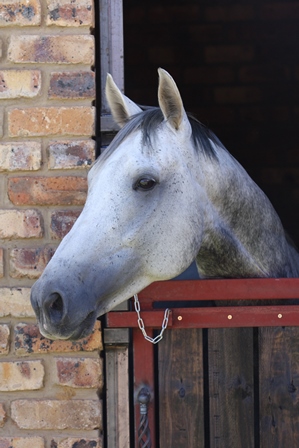How To Prevent Getting Salmonella When You're A Veterinarian In Large Animal Clinic
Salmonella FAQs

Call your veterinarian or contact the UF Big Beast Hospital at (352) 392-2229 if y'all suspect that your equus caballus may be infected with Salmonella.
- What is Salmonella?
- Can horses have Salmonella and not be ill?
- Tin people be infected with Salmonella from animals?
- How exercise horses become Salmonella?
- What are the signs of Salmonella?
- What are the signs of Salmonella in other animals, including humans?
- How is Salmonella diagnosed?
- What is the treatment for Salmonellosis?
- What is the prognosis of Salmonella?
- Should I have an Infection Command Programme on my farm?
What is Salmonella?
Salmonella is a type of bacteria that tin can cause abdominal disease (such every bit diarrhea) in horses, cattle, sheep, goats, llamas, dogs, cats, birds, humans, and many other species.
Can horses have Salmonella and not be sick?
Yes. Published studies have found that around 1 out of 100 salubrious horses shed Salmonella bacteria in their manure. Amid the subset of horses admitted to equine hospitals, the likelihood of shedding is higher – an estimated 1 in x of these horses are positive. It is possible that a horse with Salmonella in its carrion may evidence signs of infection if the organisms multiply and increase in number. This "overgrowth" tin can occur during times of stress, such every bit during transportation, illness, and hospitalization.
Can people be infected with Salmonella from animals?
Yes. In theory, any person is at chance. Though it is non a high take a chance in healthy people, they tin can be infected and get sick. Young children and allowed compromised people may be more likely to become sick if infected with Salmonella and are at greater chance of meaning complications. Therefore, it is essential to forbid them from being exposed to animals with Salmonella. If yous take questions about your detail level of risk, please consult your physician for boosted advice.
How do horses go Salmonella?
Horses may larn the bacteria from other horses or other animals. Transmission is by the fecal-oral route, which means manure from ane animal (non necessarily a horse) was ingested past another – this normally happens when the manure contaminates a feed or water source. Horses may pick upwardly Salmonella from the pasture, feed, or water sources when the feces of other animals (including birds and other horses) contaminate these sources.
What are the signs of Salmonella in horses?
- Diarrhea (most common symptom) – which can range from "cow-pie" manure to "watery" diarrhea
- Colic – peculiarly prior to the onset of active diarrhea
- Shock – commonly caused past aridity
Occasionally Salmonella can get into the claret stream and go to many different organs, including the liver, lungs, joints, and others – this is item adventure in immature animals. In chronic cases, horses may have weight loss or intermittent mild colic signs. Salmonella can cause several problems and clinical signs. If you lot take questions regarding these signs, delight contact your veterinary.
What are the signs of Salmonella in other animals, including humans?
Signs of Salmonella in other animals and humans vary from beingness obviously normal to severe gastrointestinal disease, such as abdominal hurting, diarrhea, vomiting, and cramps. Consult your veterinarian or dr. if these signs are present.
How is Salmonella diagnosed?
The most mutual diagnostic test is culture of a manure sample. Blood and other tissues tin can also be sampled. Culture results take 2 to 5 days when the sample is received at the laboratory. Fecal cultures can be negative in horses with salmonellosis, only it has been shown that cultivating multiple samples increases the probability of finding Salmonella when it is present. The usual protocol is twice per solar day for a total of v cultures.
What is the treatment for Salmonellosis?
Handling varies with the severity of salmonellosis, ranging from no treatment to intensive medical care. Treatment may include intravenous fluid therapy, antibiotics, non-steroidal anti-inflammatory drugs and plasma. These medications are important to replace fluid losses due to diarrhea, control the furnishings of the infection, and manage signs of shock.
What is the prognosis of Salmonella?
The prognosis varies with the case. Many horses may have Salmonella and never show clinical signs. Others can become sick and require intensive therapy. Some sick horses may die suddenly despite intensive therapy.
Should I take an Infection Control Program on my subcontract?
Yes. While a subcontract plan need not to be every bit extensive as in a hospital, some method of isolating new arrivals and sick horses is appropriate. New horses introduced to a barn should be isolated for approximately ii to three weeks to minimize the chance of disease to exist spread. This time allows monitoring of the new equus caballus for diarrhea or signs of respiratory illness. Horses that have newly arrived at a farm, even if they are isolated correctly, may still have Salmonella in their intestine and may later shed it if stressed.

Data provided by Dr. Martha Mallicote, Veterinarian of UF Large Animal Internal Medicine, Clinical Acquaintance Professor, DACVIM
Source: https://largeanimal.vethospitals.ufl.edu/hospital-services/internal-medicine/salmonellafaqs/
Posted by: fleishmanthorm1942.blogspot.com

0 Response to "How To Prevent Getting Salmonella When You're A Veterinarian In Large Animal Clinic"
Post a Comment